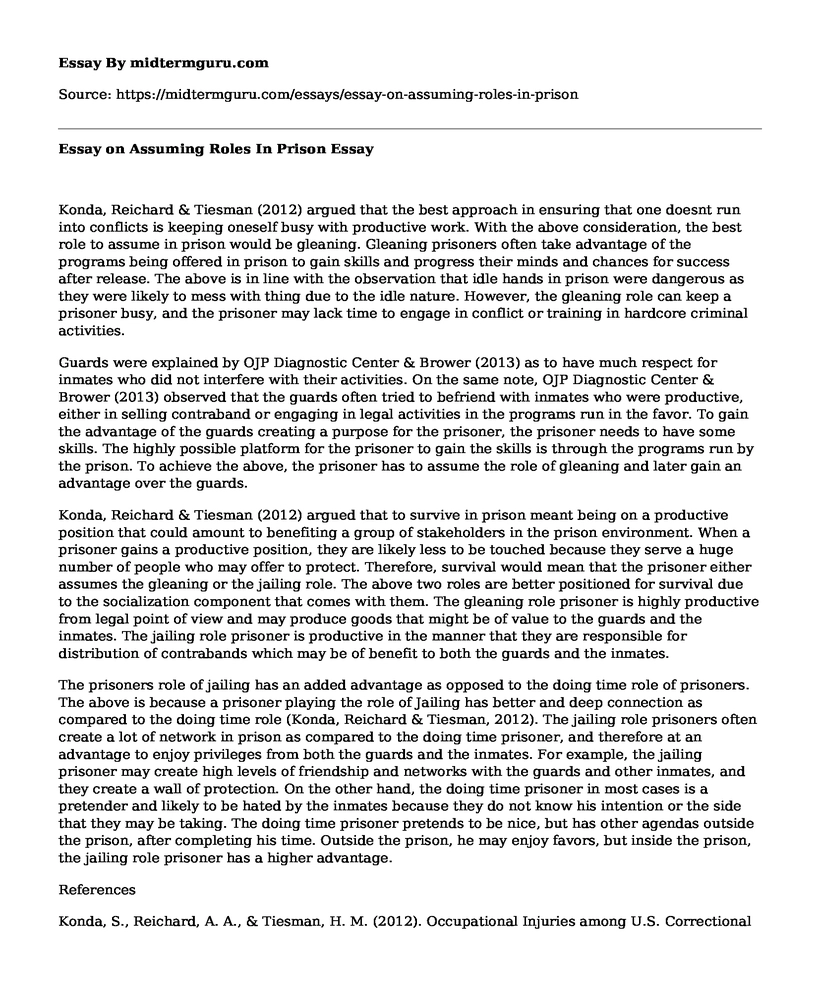Konda, Reichard & Tiesman (2012) argued that the best approach in ensuring that one doesnt run into conflicts is keeping oneself busy with productive work. With the above consideration, the best role to assume in prison would be gleaning. Gleaning prisoners often take advantage of the programs being offered in prison to gain skills and progress their minds and chances for success after release. The above is in line with the observation that idle hands in prison were dangerous as they were likely to mess with thing due to the idle nature. However, the gleaning role can keep a prisoner busy, and the prisoner may lack time to engage in conflict or training in hardcore criminal activities.
Guards were explained by OJP Diagnostic Center & Brower (2013) as to have much respect for inmates who did not interfere with their activities. On the same note, OJP Diagnostic Center & Brower (2013) observed that the guards often tried to befriend with inmates who were productive, either in selling contraband or engaging in legal activities in the programs run in the favor. To gain the advantage of the guards creating a purpose for the prisoner, the prisoner needs to have some skills. The highly possible platform for the prisoner to gain the skills is through the programs run by the prison. To achieve the above, the prisoner has to assume the role of gleaning and later gain an advantage over the guards.
Konda, Reichard & Tiesman (2012) argued that to survive in prison meant being on a productive position that could amount to benefiting a group of stakeholders in the prison environment. When a prisoner gains a productive position, they are likely less to be touched because they serve a huge number of people who may offer to protect. Therefore, survival would mean that the prisoner either assumes the gleaning or the jailing role. The above two roles are better positioned for survival due to the socialization component that comes with them. The gleaning role prisoner is highly productive from legal point of view and may produce goods that might be of value to the guards and the inmates. The jailing role prisoner is productive in the manner that they are responsible for distribution of contrabands which may be of benefit to both the guards and the inmates.
The prisoners role of jailing has an added advantage as opposed to the doing time role of prisoners. The above is because a prisoner playing the role of Jailing has better and deep connection as compared to the doing time role (Konda, Reichard & Tiesman, 2012). The jailing role prisoners often create a lot of network in prison as compared to the doing time prisoner, and therefore at an advantage to enjoy privileges from both the guards and the inmates. For example, the jailing prisoner may create high levels of friendship and networks with the guards and other inmates, and they create a wall of protection. On the other hand, the doing time prisoner in most cases is a pretender and likely to be hated by the inmates because they do not know his intention or the side that they may be taking. The doing time prisoner pretends to be nice, but has other agendas outside the prison, after completing his time. Outside the prison, he may enjoy favors, but inside the prison, the jailing role prisoner has a higher advantage.
References
Konda, S., Reichard, A. A., & Tiesman, H. M. (2012). Occupational Injuries among U.S. Correctional Officers, 1999-2008. Journal of Safety Research, 43(3), 181-186. doi:10.1016/j.jsr.2012.06.002
OJP Diagnostic Center, & Brower, J. (2013). Correctional Officer Wellness And Safety Literature. Retrieved March 2, 2017, from https://www.ojpdiagnosticcenter.org/sites/defult/files/spotlight/download/NDC_CorrectionalOfficerWellnessSafety_LitReview.pdf
Cite this page
Essay on Assuming Roles In Prison. (2021, Jun 07). Retrieved from https://midtermguru.com/essays/essay-on-assuming-roles-in-prison
If you are the original author of this essay and no longer wish to have it published on the midtermguru.com website, please click below to request its removal:
- Essay Example on the Crime Rates in Cities
- Essay on Black Lives Matter Movement and Increase of Crime Rate
- Paper Example on Delinquency Among the Minority Races in the United States
- Essay Sample on Research in Criminal Justice
- Grassroots Groups Unite to Champion Rights of Local Communities in US - Research Paper
- Resistance: Active vs. Passive Protesting for Injustice - Essay Sample
- Katherine Knight: The Worst Female Murderer in Australian History - Essay Sample







